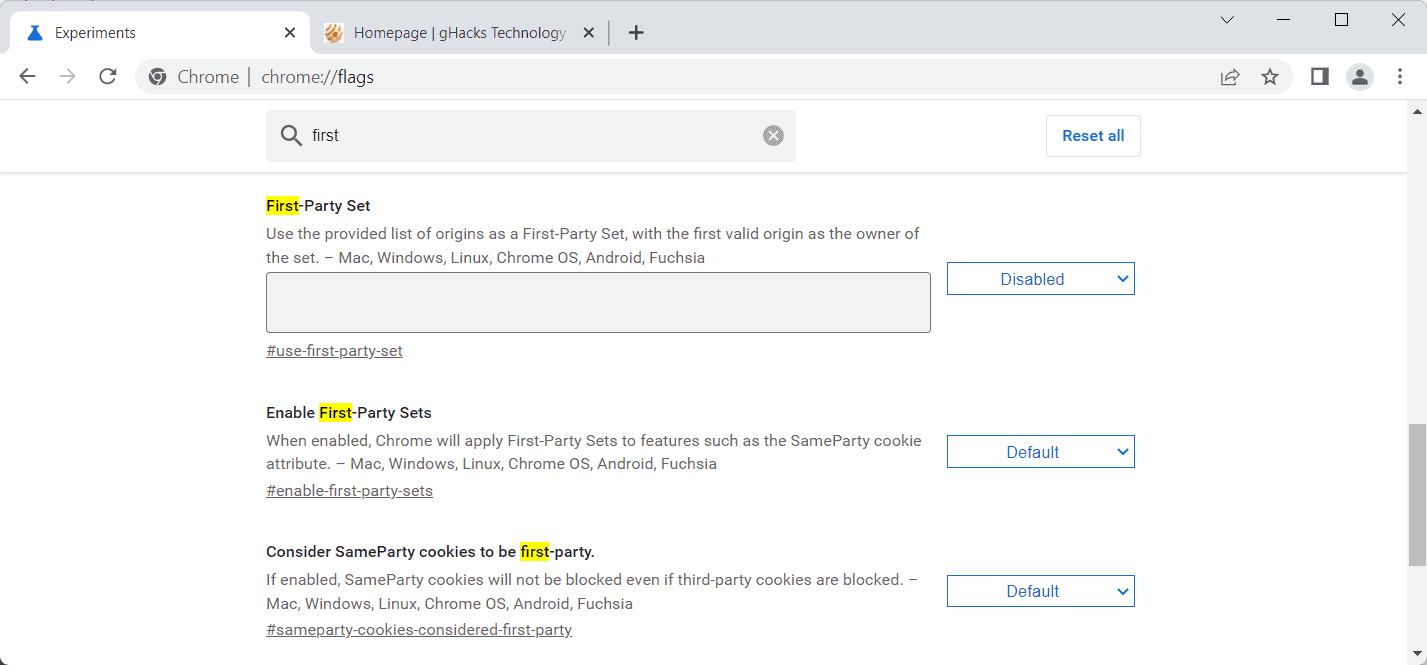First-Party Sets is a proposed feature by Google that is designed to give site owners an option to declare multiple owned sites as first-party. Companies may own multiple domain names, and with first-party sets, they could get supporting browsers to handle all of the properties identical.

Currently, different domain names are considered third-parties in most cases, even if they belong to the same company. With the new technology in place, Google could group all of its properties together to improve communication and data flows between them.
Brave believes that first-party sets are harmful to user privacy, as companies may use the feature to track users across their properties. Third-party cookies, which are used for the same tracking purpose, will be a thing of the past soon.
Google explains that first-party sets “define a more realistic ‘privacy boundary’ by reflecting the real-world organization of websites, which often span multiple registrable domains”. Google points out that the feature would standardize functionality for the entire Web.
Mozilla, the organization that is making the Firefox web browser, declared First-Party Sets harmful back in 2020. Feedback from Apple was positive, according to this Chrome Status page.
Brave Software, maker of the Brave browser, joined Mozilla recently in declaring first-party sets an anti-privacy feature. Brave Senior director of privacy, Peter Snyder, pointed out on the official blog that the adoption of the feature would make it harder for “user-respecting browsers to protect their users’ privacy”.
First-Party Sets will allow more sites to track more of your behavior on the Web, and make it more difficult for users to predict how their information will be shared.
Snyder believes that Chrome’s dominance will likely lead to the implementation of the feature in other browsers to “maintain compatibility with the Web”. Chrome has a market share of over 60% and many browsers are using the same source as Chrome already. The two main exceptions are Apple’s Safari and Mozilla’s Firefox web browser. Other browsers, including Microsoft Edge, Brave, Vivaldi or Opera, use Chromium as the source.
First-party sets enable the tracking of users across properties that organizations and individuals own. Google could declare most of its properties a first-party set; this would mean that if a user is known on google.com, it is also known on any other site of the first-party set, even if that site was never visited or is visited for the first time.
Google would know about the user who visits YouTube, Blogger, or Alphabet.com for the first time, provided that these domains would be in the same first-party set. Worse still, according to Snyder, users would have no control over the mechanism.
Google is arguing that first-party sets is improving privacy, as it paves the way for removing support for third-party cookies in the browser. Snyder argues that first-party sets is not a privacy feature, but one designed to “ensure companies can continue to identify and track people across sites”.
Google is continuing its work on its Privacy Sandbox project. The company dropped support for the controversial FLoC in January 2022 to replace it with the equally-controversial Topics system. The company is running advertising system trials in Chrome currently.
Chrome’s dominance makes it difficult to oppose features. While browser makers may choose to ignore certain features that Google implements in Chromium and Chrome, it could result in web compatibility issues, as many developers look at Chrome first when it comes to web standards and support.
Now You: what is your take on first-party sets?
Thank you for being a Ghacks reader. The post Brave joins Mozilla in declaring Google's First-Party Sets feature harmful to privacy appeared first on gHacks Technology News.
